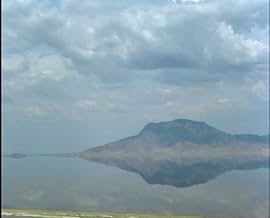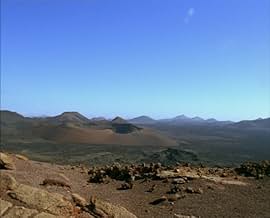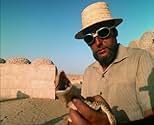IMDb RATING
6.7/10
4.3K
YOUR RATING
Footage shot in and around the Algerian Sahara Desert, accompanied only by a spoken creation myth and the songs of Leonard Cohen.Footage shot in and around the Algerian Sahara Desert, accompanied only by a spoken creation myth and the songs of Leonard Cohen.Footage shot in and around the Algerian Sahara Desert, accompanied only by a spoken creation myth and the songs of Leonard Cohen.
- Director
- Writer
- All cast & crew
- Production, box office & more at IMDbPro
Featured reviews
Fata Morgana is, by far, one of the weirdest and most perplexing art films I have ever seen. I hesitate to call it a documentary because, while is does have elements of documentation of it's images, the images themselves are so unusual, so hallucinogenic, so unclear, that I wonder whether it was really worth telling this story just so that these images can exist. The film basically is the tale of the earth and the creation of the earth shot from the perspective of an outsider, be it alien or something otherwise indescribable, all taking place in the Sahara desert. The title of the picture relates to the illusion or reflection of images, both real and hallucinated, that people in the desert often witness. These are also known as mirages.
The film opens with a plane landing followed by the plane landing again and then again and again and again and again and again and again. With each plane landing shot, the actual architecture of both the location it is landing at and the plane itself begin to slowly dissolve into one another and grow less and less real and more and more reflective imagery. The imagery in this film only grows more intense and more unusual as the picture continues. The narration of the film tells of the creation of the universe as alarming sexual images of sand and landscape move past the camera. The shots go further and further into the desert and Herzog films whatever he sees and finds. The strangest reflections of the world are on display in the distance while Herzog meets some of the most pure and photogenic collections of outsiders that you are ever likely to see. When the Leonard Cohen soundtrack kicks in, you can be sure that you are in the world of a mad man who is in love with the universe.
I cannot say too much more about this film without ruining anything, but I will say that it is a sobering experience and there's really nothing like it. I love seeing films that are just in classes of their own. This film certainly is a good example of how Herzog loves to intermingle narrative storytelling and documentary film-making into an interchangeable form. Fata Morgana unfortunately does overstay it's welcome just a bit, but by the time it nears it's end the images will most likely be burned into your mind forever. Definitely a must-see for those who are obsessed with the nature and the origin of the universe.
The film opens with a plane landing followed by the plane landing again and then again and again and again and again and again and again. With each plane landing shot, the actual architecture of both the location it is landing at and the plane itself begin to slowly dissolve into one another and grow less and less real and more and more reflective imagery. The imagery in this film only grows more intense and more unusual as the picture continues. The narration of the film tells of the creation of the universe as alarming sexual images of sand and landscape move past the camera. The shots go further and further into the desert and Herzog films whatever he sees and finds. The strangest reflections of the world are on display in the distance while Herzog meets some of the most pure and photogenic collections of outsiders that you are ever likely to see. When the Leonard Cohen soundtrack kicks in, you can be sure that you are in the world of a mad man who is in love with the universe.
I cannot say too much more about this film without ruining anything, but I will say that it is a sobering experience and there's really nothing like it. I love seeing films that are just in classes of their own. This film certainly is a good example of how Herzog loves to intermingle narrative storytelling and documentary film-making into an interchangeable form. Fata Morgana unfortunately does overstay it's welcome just a bit, but by the time it nears it's end the images will most likely be burned into your mind forever. Definitely a must-see for those who are obsessed with the nature and the origin of the universe.
Famed filmmaker Werner Herzog's "Fata Morgana" is breathtakingly unorthodox. Although characters appear in the film from time to time, there is no actual story. The film is also not an educational or historical documentary. It's a film without an accompanying screenplay.
The film consists of curious background music and a somewhat illogical narrative VO, the combination of which overlays a long string of images from mostly, though not exclusively, the Sahara Desert. Some of the images are wonderfully odd, and out of the ordinary. The camera captures ghostly images, or mirages, optical illusions that tantalize and mesmerize.
This general cinematic trend is punctuated by occasional observational asides on serendipitous topics. For example, in one sequence a man wearing goggles gives us a mini-tutorial on lizards. And in what for me was the most captivating and bizarre sequence, a small inset room contains a man with dark goggles who sings in a voice that is totally distorted by the microphone he's using, accompanied by an old lady who plays a punchy tune on an old piano. Neither the man nor the old lady seems to enjoy what they're doing. How baroque.
"Fata Morgana" does have an underlying concept, one that unites the wide assortment of strange images and eclectic sounds. But that concept is so subtle, so opaque that you'll never figure it out without help. From this subtle theme the film does indeed make sense. Without that point of reference, however, the film can seem tedious and unending, a pointless parade of random earthy images and esoteric narrative gibberish.
Unapologetically redundant, thematically baffling, and cinematically heretical, "Fata Morgana" will likely either make you swoon with delight, or cause you to throw up. You'll either latch on to the film's Zen-like qualities or be tempted to smash the DVD into a thousand pieces. One thing that most viewers will agree on: "Fata Morgana" is ... different.
The film consists of curious background music and a somewhat illogical narrative VO, the combination of which overlays a long string of images from mostly, though not exclusively, the Sahara Desert. Some of the images are wonderfully odd, and out of the ordinary. The camera captures ghostly images, or mirages, optical illusions that tantalize and mesmerize.
This general cinematic trend is punctuated by occasional observational asides on serendipitous topics. For example, in one sequence a man wearing goggles gives us a mini-tutorial on lizards. And in what for me was the most captivating and bizarre sequence, a small inset room contains a man with dark goggles who sings in a voice that is totally distorted by the microphone he's using, accompanied by an old lady who plays a punchy tune on an old piano. Neither the man nor the old lady seems to enjoy what they're doing. How baroque.
"Fata Morgana" does have an underlying concept, one that unites the wide assortment of strange images and eclectic sounds. But that concept is so subtle, so opaque that you'll never figure it out without help. From this subtle theme the film does indeed make sense. Without that point of reference, however, the film can seem tedious and unending, a pointless parade of random earthy images and esoteric narrative gibberish.
Unapologetically redundant, thematically baffling, and cinematically heretical, "Fata Morgana" will likely either make you swoon with delight, or cause you to throw up. You'll either latch on to the film's Zen-like qualities or be tempted to smash the DVD into a thousand pieces. One thing that most viewers will agree on: "Fata Morgana" is ... different.
Fata Morgana is an absolute masterpiece. It's Werner Herzog's most unconventional film. It doesn't have a plot or story. Instead of a story, we're given a collection of images, words and music that work so wonderfully together. It's not a documentary either. Some of the people in this film are directed and given lines to read. It has some of the most beautiful and haunting images. Herzog shoots real mirages and we see cars and people floating around in the middle of the desert who aren't actually there but hundreds of miles away reflected like in a mirror. The use of music in this movie is so brilliant - from Leonard Cohen, Mozart, and the Third Ear Band. Imagine Stanley Kubrick's 2001: A Space Odyssey in the desert; that's what this movie is like. This film is so hypnotic that it has the ability to make you feel as though your spirit has left your body. A must see. It will change the way you view films. Rating: 10 out of 10.
Fata Morgana (1971)
* 1/2 (out of 4)
I knew what I was getting into with this film so I actually read the production notes to before getting to the movie itself and I must admit that the notes were a lot more entertaining. Now, I certainly see why some might love this movie and call it a masterpiece but at the same time, to me, this is just a movie that's "art" for the sake of being art. There's really an interesting movie to discuss here but it's just not an entertaining one and no matter what type of art you're trying to create, the importance of being entertaining can never be overlooked. There's really no way to fully describe or give a plot detail of this film but it's pretty much Herzog's documentary on why images are so important. Shot in Africa, we get all sorts of images of the desert as well as various other tracking shots, which are shown with narration as well as a soundtrack by Leonard Cohen and Blind Faith. I'm really not sure what to say about this film except that it didn't work for me and Herzog's attempt to show the visuals as "aliens looking around" just didn't work. This is something Herzog would attempt later in his career and to me these type of thoughts have always been a miss. I'm sure Herzog has something to say with the film but I don't see it being said in the film itself. I've read his comments and listened to parts of the commentary where he explains things but if it weren't for this, the movie itself wouldn't have said anything. There are certainly some surreal moments and there's no question that a brilliant mind is behind all the images but in the end the film left me cold and bored, which is something I can't say about too many of Herzog's films as he's one of my favorites.
* 1/2 (out of 4)
I knew what I was getting into with this film so I actually read the production notes to before getting to the movie itself and I must admit that the notes were a lot more entertaining. Now, I certainly see why some might love this movie and call it a masterpiece but at the same time, to me, this is just a movie that's "art" for the sake of being art. There's really an interesting movie to discuss here but it's just not an entertaining one and no matter what type of art you're trying to create, the importance of being entertaining can never be overlooked. There's really no way to fully describe or give a plot detail of this film but it's pretty much Herzog's documentary on why images are so important. Shot in Africa, we get all sorts of images of the desert as well as various other tracking shots, which are shown with narration as well as a soundtrack by Leonard Cohen and Blind Faith. I'm really not sure what to say about this film except that it didn't work for me and Herzog's attempt to show the visuals as "aliens looking around" just didn't work. This is something Herzog would attempt later in his career and to me these type of thoughts have always been a miss. I'm sure Herzog has something to say with the film but I don't see it being said in the film itself. I've read his comments and listened to parts of the commentary where he explains things but if it weren't for this, the movie itself wouldn't have said anything. There are certainly some surreal moments and there's no question that a brilliant mind is behind all the images but in the end the film left me cold and bored, which is something I can't say about too many of Herzog's films as he's one of my favorites.
I find Herzog's documentary work to be very uneven. Fata Morgana, a companion piece of sorts to Lessons of Darkness, lacks not only the harrowing spectacle but mostly the discerning eye of an author. It is by comparison amateur looking, aimless pans left and right across the desert the kind of which you would expect from any German tourist equipped with a handycam, the camera left running from the window of a car picking up all kinds of meaningless images, wire fences, derelict buildings and patches of dirt going through the lens in haphazard order, intercut with shots of sand dunes. At one point Herzog encounters a group of starved cattle rotting away in the sand, yet the image is presented much like you and me would, perhaps worse, the camera peering hand-held from one cattle to the next. For a documentary that attempts to be a visual feast, a hypnotic, surreal excursion in uncharted landscapes, it lacks the visual orchestration and conviction of a disciplined author. It's all over the place, half-hearted and tedious, Mayan creation myths recited in voice-over, then some other text Herzog fancied for literature. It's not until near the end that Fata Morgana jumps alive through a series of bizarre encounters. First with a man and a woman playing music in a room, the man singing in a distorted voice through a mic, both of them apathetic in their task. A man holding up a turtle. A group of old people trying to get out of some holes in the ground. Other than that, this one seems to have very little of substance to offer or visual splendor to offer.
Did you know
- TriviaOne of two films from 1971 to feature a trio of songs by Leonard Cohen, the other being Robert Altman's McCabe and Mrs. Miller.
- ConnectionsFeatured in I Am My Films (1978)
- SoundtracksHey, That's No Way to Say Goodbye
Written and Performed by Leonard Cohen
- How long is Fata Morgana?Powered by Alexa
Details
Contribute to this page
Suggest an edit or add missing content























